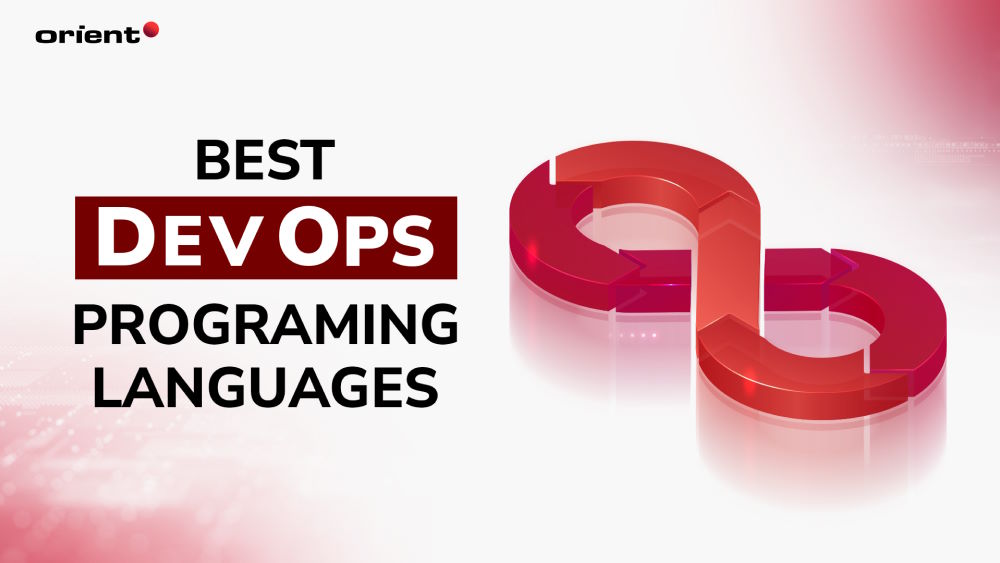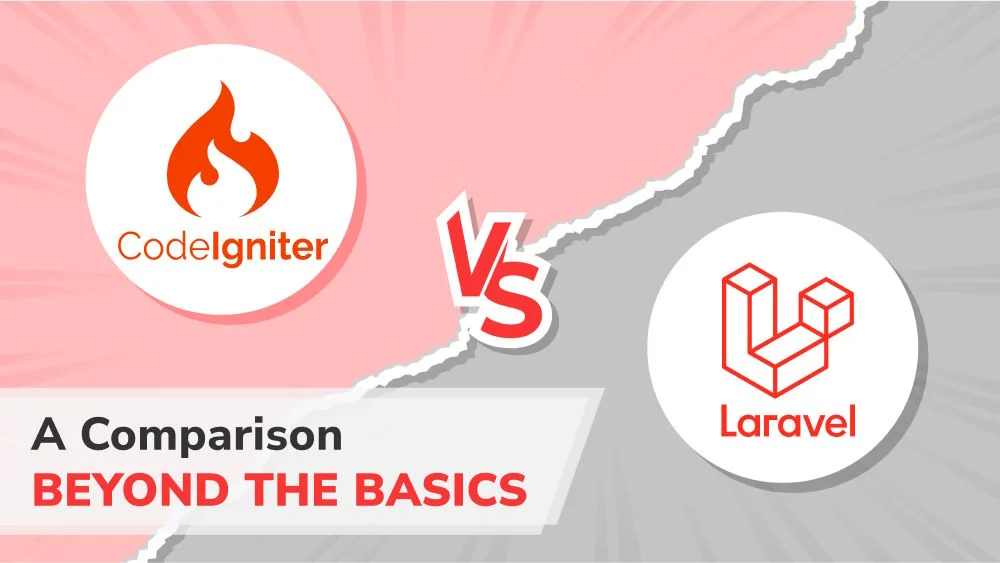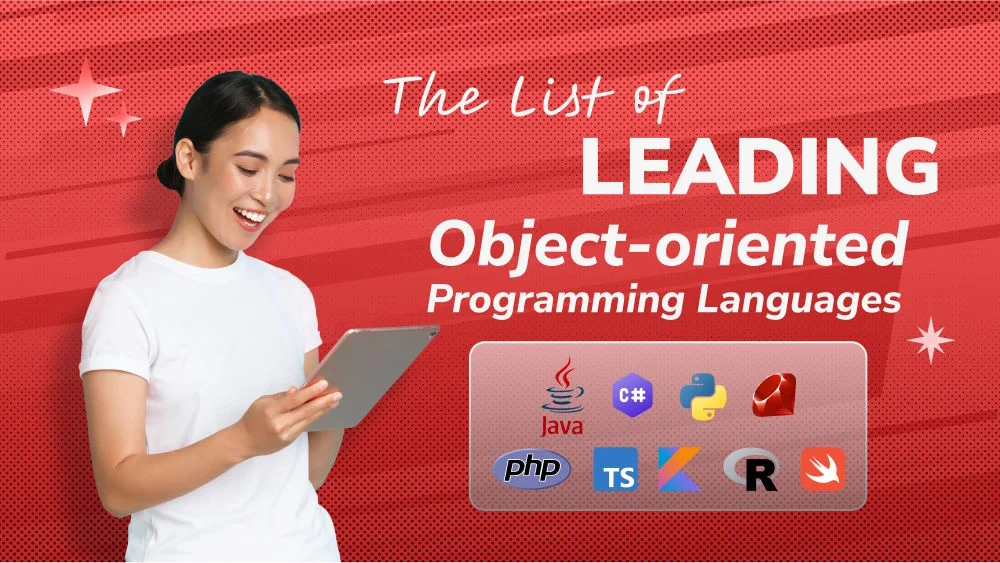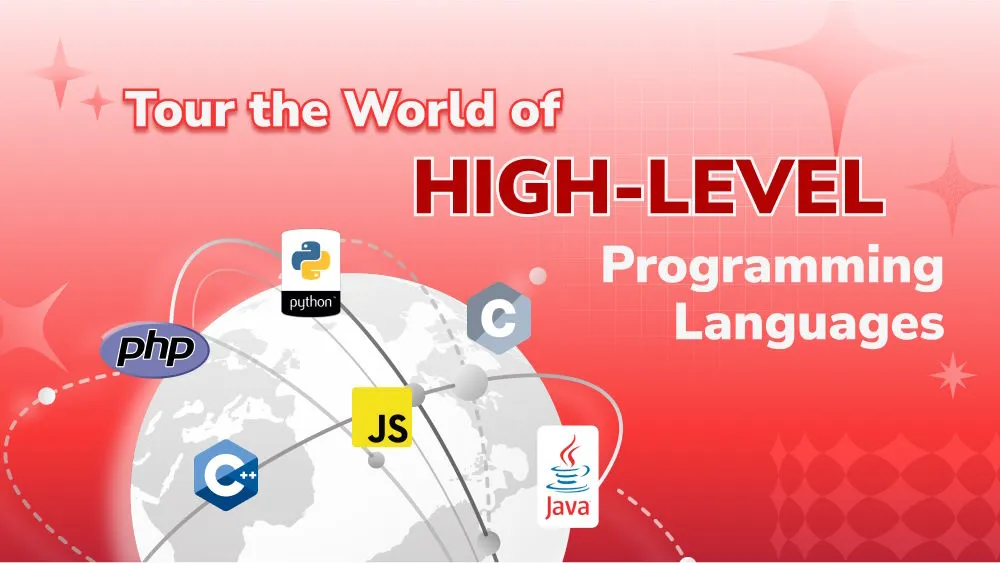Which Is the Best DevOps Programming Language?

Content Map
More chaptersCoined in 2009 by Patrick Debois, DevOps has become today’s norm in software development and deployment. Whether the code repository is hosted on a cloud platform or in an on-premises server, DevOps has brought many benefits to the plate and made it easier for software engineers to develop and deploy their applications faster.
But with DevOps, there is one question: What programming language is the best for DevOps software development methodology? The answers may not consent to the same programming language as it depends on the type of project and specific requirements. Read on to understand what a coding language for DevOps is and run through the most popular programming languages for DevOps engineers.
What Is a Programming Language for DevOps?

DevOps is often described in software engineering as automated approaches to building, testing, and deploying applications and services. It is a set of practices and tools leveraged to foster close collaboration and share responsibility between the two pillars – Development (Dev) and IT Operations (Ops) teams. DevOps culture is aimed at eliminating the silos and facilitating synergy, allowing departments to support and supplement each other by combining the skill sets of both teams.
The term “DevOps programming language” is defined as a coding language that enables the automation and deployment of applications in the DevOps environment. This process includes provisioning, configuration management, application deployment, infrastructure as code, and monitoring. Or it can also refer to scripting language used in conjunction with DevOps tools for cloud orchestration and continuous delivery.
Although DevOps is not limited to a particular language, picking the best coding language for your project is essential. Not all languages are made equal, and each has its own pros and cons when used in different cases of software development.
Evaluate the Right Programming Language for DevOps

When it comes to DevOps, most of the common programming languages have been used in some shape or form. There are too many options, so making a selection can be overwhelming for anyone. Also, remember that there will be no one-size-fits-all choice even the most popular programming language has its upsides and downsides when being put into DevOps use.
But don’t let this dishearten you; instead, use it as an opportunity to find the right programming language that fits your project objectives best. To do so, get to know the programming languages in terms of features, scalability, maintainability and readability of code, community support available (forums/tutorials), integration with DevOps tools, and other factors.
Scalability
DevOps engineers should consider programming languages that can accommodate all of your project’s needs without any hiccups, especially when dealing with large-scale systems or handling massive data volume, high traffic loads, and complex computations. A scalable programming language should have the following features:
- Concurrency and Parallelism: It enables multiple computations to occur simultaneously.
- Memory Management: Efficient handling of memory allocation and deallocation is crucial for scalability.
- Modularity: The language should allow the code to be broken down into smaller, reusable pieces (modules), which makes the code easier to manage and scale.
Performance
This is a metric that indicates how much computational resources (CPU time, memory, disk I/O, network bandwidth) are consumed when executing a program written in a language. A performant DevOps language should generate programs that execute quickly, use memory efficiently, and minimize resource usage, and it must be attached to these features:
- Efficient Compilation and Execution: The language’s compiler should generate efficient machine code.
- Data Structures and Algorithms: The language should support efficient data structures and algorithms.
- Low-Level Access: The language should provide access to low-level system resources, allowing for fine-tuned performance optimizations.
Given that your project requires low-latency operations or complex computations, you should pick a programming language with powerful optimization capabilities and runtime speedups.
Speed
The speed of programming languages is essential in DevOps development as it allows developers to quickly deploy and test their applications. A fast programming language should offer fast builds, rapid write-compile-run cycles, minimal latency for running code, and low memory consumption. Ones are labeled fast depending on multiple factors, including how it is compiled, the nature of its runtime environment, and its data structures and algorithms:
- Compilation: Some languages, like C++ and Java, are compiled into machine code, which often leads to faster execution times. Other languages, like Python and Ruby, are interpreted, which may result in slower execution because each instruction is read and executed one at a time during runtime.
- Runtime Environment: Languages that run on virtual machines, like Java or C#, may be slower than languages that run directly on the hardware.
- Data Structures and Algorithms: The way a language handles data structures and algorithms can also affect speed. Efficient use of these can lead to significant speed improvements.
Security
The security feature should not be an afterthought. It should be considered the first priority. So, when selecting a coding language, make sure the security facet must be taken into account. Ensure that the language you choose has built-in security features and standard libraries that validate input data, protect against cyberattacks, and limit user privileges.
Integration & Compatibility
DevOps automation requires integration with other tools and technologies. Hence, you should go with a coding language that is compatible with existing application frameworks and operating systems, as well as other tools your project uses.
In addition, you should be able to use the language in conjunction with different types of software applications such as databases (SQL/NoSQL), web servers, cloud platforms, or DevOps tools like Chef, Puppet, Jenkins, etc. Also, check if existing APIs (application programming interfaces) and SDKs are available for the language or if there is a need to write custom code.
Maturity & Community Support
The best programming language for your choice should be mature and backed by a large and active community of users. This plays the role of a go-to online source (includes forums, tutorials, blogs, books, and other resources) for beginners and advanced programmers alike to get help with technical issues, best practices, tutorials, and troubleshooting whenever needed. It means developers can find answers to their questions quickly without waiting too long for a response.
Maintainability & Readability
Last but not least, developers should contemplate maintainability and readability – two critical attributes of any programming language selected for DevOps.
Maintainability refers to how easy it is for developers to understand, correct, update, and enhance a codebase over time. This is crucial since the DevOps context involves continuous integration (CI) and continuous deployment (CD) - which requires frequent modifications and updates to the codebase.
Simple as it sounds, readability is the ease with which developers can understand and follow code written in a language. Oftentimes, a highly readable language minimizes the cognitive load on engineers and makes it easier for them to understand the code’s purpose and logic. This is particularly important in a DevOps environment in which collaboration and communication are key.
Top Programming & Scripting Languages for DevOps Engineers

As aforementioned, there is a great deal of programming languages with varying strengths and capabilities that make them suitable for DevOps. The more coding languages are available; the more difficult it is to pick and choose the best one.
Even though most coding languages are designed and optimized for versatility and usability, some can be a better choice than other programming languages on different fronts. Below are some suggestions for the top programming and scripting languages for DevOps:
Python
First on this list is Python – No.1 on the list of the most popular programming languages, according to PYPL. Python is a powerful, mature, high-level language created by Guido van Rossum in 1989 and used extensively for DevOps projects. It offers simple syntax, built-in libraries for automation, scalability, speed optimization, and integration with various tools and frameworks, such as Ansible, Kubernetes, Jenkins, and more.
Python places a premium on readability and simplicity, making this language easy to learn and use – which is why it has become a go-to one for beginners as well as experienced developers alike. Additionally, Python is renowned as a general-purpose programming language ideal for building web applications, data science, artificial intelligence (AI), machine learning, etc. ChatGPT – the currently rising star in the AI world – is a model written in Python, for example.
Java
This is one of the oldest coding languages still in use today. Java is considered a compiled and interpreted programming language and one of the powerful object-oriented platforms that work across operating systems. It is also highly portable, meaning a single codebase can be used for different types of platforms, which simplifies DevOps workflows.
Java is well suited to developing complex applications quickly as it integrates with the vast majority of development tools and IDEs (Integrated Development Environments). Moreover, Java is highly scalable and offers high performance – which makes it a great choice for microservice-based applications. Also, Java is selected for cloud-native development, machine learning, big data processing, and enterprise software development due to its scalability and extensibility.
JavaScript
Often referred to as the language for creating web forms, JavaScript scripting language can be used for client-side and server-side operations. It works with HTML, CSS, and other components to create interactive websites and web apps quickly.
The language is fast, reliable, and highly secure – making it optimal for front-end development. The support of a large global community makes it easy to find help whenever needed. JavaScript also bridges DevOps teams and other areas (such as UI/UX design) due to its flexibility in creating interactive user interfaces. JavaScript’s multi-paradigm style allows developers to choose the most effective way to solve a particular problem based on their own preferences and the specific requirements of their project.
JavaScript is the best suited for building DevOps pipelines as it supports multiple frameworks, such as AngularJS and React, along with powerful libraries like jQuery and Node.js. It is also well-suited for automating repetitive tasks, which helps optimize development and IT operations and streamlines DevOps workflows.
Structured Query Language (SQL)
There are a few scripting languages that provide faster access to data stored in relational databases. SQL is the most widely used language for such operations. SQL, or Structured Query Language, is a scripting language used for designing and managing relational databases on the web. It’s a popular go-to platform for setting up data warehouses, querying multiple databases, making modifications to schemas, etc. It can be used with almost all database systems, such as Oracle Database, MySQL, Microsoft SQL Server, etc.
The DevOps context requires scalability of data warehouses in order to handle large amounts of incoming data from various sources. As such, SQL is a cost-effective choice for building robust and reliable data warehouses that can store vast amounts of data. Furthermore, it provides an easy way to pull useful information from databases, which helps DevOps teams make informed decisions quickly.
PHP
PHP stands for Hypertext Preprocessor, and it is a general-purpose scripting language used to build dynamic websites and web applications. It is also open-source and free, making it easy to install, configure, and use. Additionally, PHP works well with HTML, CSS, JavaScript, AJAX (Asynchronous JavaScript & XML), JSON (JavaScript Object Notation), and other scripting languages to create interactive user interfaces.
PHP is particularly suitable for developing backend operations quickly. Another great feature of PHP is that it works with various databases, such as MySQL, Oracle Database, and MariaDB. PHP has become increasingly popular for DevOps teams because of its scalability and ability to handle large workloads. It can also be easily integrated with various development tools, such as GitHub (version control), Jenkins (CI/CD server), and more. All of these features ensure that DevOps teams can quickly build powerful and reliable applications with PHP.
Perl
Perl is an open-source, high-level scripting language – used mainly for web application development, system administration, network programming, and GUI applications. It’s extensible and portable, meaning it can be used across different types of platforms.
In terms of DevOps, Perl is one of the best scripting languages. It is incredibly powerful and fast, making it ideal for automating repetitive operations. Additionally, due to its wide range of libraries and modules, Perl can easily be integrated with other programming languages like Java, C++, Python, SQL, and more. This makes it easy to use various DevOps tools from different programming languages together in a single pipeline.
Ruby
Created in 1995 by Yukihiro Matsumoto (a.k.a Matz), Ruby is one of the most preferred scripting languages for automating repetitive tasks. It has a simple syntax and is object-oriented, making it easy to learn and use. Additionally, engineers often choose to develop web apps with Ruby due to its high performance and scalability.
Due to its extensibility and ability to easily handle complex operations, Ruby must be on any list of DevOps programming languages. It’s also great for automating testing, deployment, and integration processes, simplifying the development lifecycle. Plus, it integrates well with various DevOps tools, such as RSpec, Cucumber, and Capybara.
Ruby is a broadly used language for building websites, web applications, and data analysis solutions like AI/machine learning-driven products.
Go
Golang (a.k.a Go) is a younger coding language designed and created by Google in 2009. It has powerful features such as concurrency, garbage collection, type safety, interfaces, and memory management that make it particularly suitable for DevOps projects.
Go is optimized for speed and provides an easy way to build robust, reliable applications without dealing with a lot of overhead. This makes it perfect for creating microservices-based applications that need to be delivered quickly and securely. Additionally, Go integrates well with various DevOps tools such as GitHub, Jenkins, Chef, Kubernetes, Ansible, etc., which makes it easier to manage the development lifecycle. Together with Java and Python, Go makes up a list of the fastest programming languages.
Need help with DevOps adoption? Come to Orient Software today. Why us? We have you covered with our expert teams. As your trusted partner, we offer DevOps training and consulting services. Our experts can assist you in filling the gap for your demands if you lack DevOps professionals. We can build a dedicated team to focus solely on your project or staff yours with augmented professionals. Whatever your specific needs are - our team has got it covered. All you need to do is to get in touch with us.







